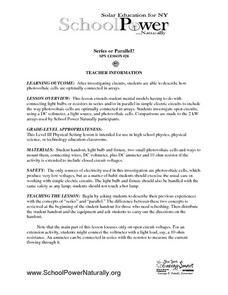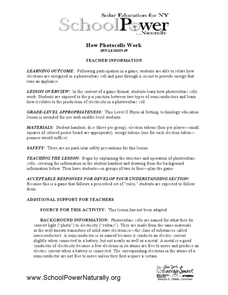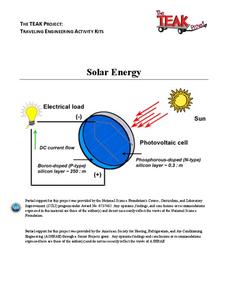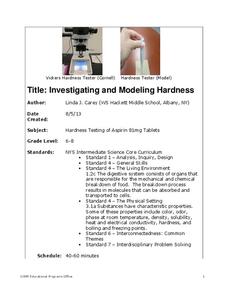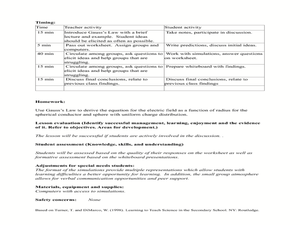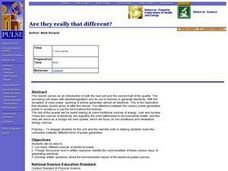Curated OER
Series or Parallel?
Physics classes that are studying electricity connect photovoltaic cells into both series and parallel circuits. Inquiry and critical thinking come into play as learners try to determine which circuit is more productive. They associate...
Curated OER
The Physics of Electricity: Real or Magic?
Eighth graders participate in various demonstrations on electricity. In this physics lesson, 8th graders explore static and current electricity. They apply concepts to real world situations.
Teach Engineering
Circuits
Don't know how to make the initial connection on electric circuits? This lesson provides the background to present the introductory vocabulary to learning about electric circuits. It is organized in a meaningful progression with an...
Ohio State University
Ohm's Law
Have you ever wanted to build a conductor? Here is a lesson that takes pupils through building a conductor based on Drude's model in order to better understand electricity.
Curated OER
Electric Field Mapping in 3D
Students create a 3D vector field map of an electric field. In this physics lesson, students measure the voltage inside an aquarium with water. They present their findings and map to class..
Curated OER
Electricity/Magnetism
Fourth graders explore magnets as fundamental parts of generators and how they are used to produce current electricity. They distinguish between the north and south pole of magnets and the difference between repel and attract. Students...
Curated OER
Alessandro Volta: The Invention of the Voltaic Pile (The First Electric Battery)
Students conduct a series of experiments on electricity. In this physics lesson, students study the work of Alessandro Volta particularly his experiment on the the Voltaic Pail. They build their own Voltaic Pile to recreate his experiment.
Curated OER
Electricity
Young scholars identify the relationship between batteries, circuits and voltage. In this physics lesson, students investigate the way batteries are put into different apparatus. They discuss why different machinery need different...
Curated OER
Energy Conversion in Electricity – Resistors and Circuits
Students explore electrical energy. In this electricity lesson plan, students design and build a large circuit in order to determine whether circuit size correlates with the light of a bulb.
Curated OER
How Photocells Work
Give small groups of physical scientists tokens that represent electrons in a photovoltaic cell. They play a dice game in which they move the tokens around, representing the flow of electrons through the p-n junction of a semiconductor...
Curated OER
Electrical Energy
Young scholars compare and contrast a cell and a battery. In this physical science lesson, students explain how they create energy. They conduct an experiment to apply what they have learned in this lesson.
Curated OER
Solar Kit Lesson #15 - Solar-Powered Electrolysis of Water and the Hydrogen Economy
An outstanding lesson awaits your physics fledglings! After reading about how hydrogen can act as an energy carrier, they examine the electrolysis of water using solar power. They test the gases produced for flammability and will...
Rochester Institute of Technology
Solar Energy
Warm up to the idea of solar energy. A lesson plan includes three activities that challenge scholars to apply knowledge in new ways. First, they learn to run an alarm clock without a battery by using solar energy. Next, they complete an...
Science Matters
Forms of Energy
The amount of energy Americans use doubles every 20 years. The first instructional activity in a 10-part series teaches scholars about different forms of energy. They rotate through five stations with hands-on activities or experiments...
Cornell University
Investigating and Modeling Hardness
Model hardness testing with a self-designed hardness test. Young scholars rate the hardness of different types of aspirin using the Vicker's Hardness scale. They then relate hardness to the solubility of each aspirin tablet.
Curated OER
The Phantom of the Computer Lab
Students calculate the power consumption of computers in school. In this physics lesson, students design an experiment to determine whether the school should unplug computers at the end of the day. They collect data and report findings...
Curated OER
WiTricity Explained
Students explain how electricity is transferred from source to load without actual wires connecting the two. In this physics lesson, students explore how wireless electricity was discovered. They cite practical applications of this...
Curated OER
Gauss' Law
Learners derive the equation of Gauss's law. In this physics instructional activity, students investigate the factors affecting the strength of the electric field. They perform simulation on Gauss's law.
Curated OER
Science: Generating Electricity
Eighth graders examine the various methods of generating electricity and explain their commonalities. They determine what is the most common source of energy and what are the potential environmental health hazards due to electrical...
Curated OER
The Electric Hookup
Students determine the wattage of appliances found in the home. They identify ways to conserve energy and calculate the number of kilowatt-hours that appliances use. They also discover the costs per kilowatt-hour for the appliances.
Curated OER
Dependence of Light Intensity on Distance
Hopefully you have a sensor interface for your physics class to use with graphing calculators when collecting data with a light sensor. If so, read on. Use this resource for learners to predict and then test whether or not the intensity...
Curated OER
Solar Energy in New York
Middle schoolers examine a variety of information for New York State including insolation data, and economic or political data, thus incorporating both science and social studies. Encouraging learners to become concerned citizens as they...
Curated OER
Orienting a Photovoltaic Cell
By mounting a light bulb on a stand and a PV cell on another, physics apprentices experiment with the angle of incidence. Their goal is to determine the optimum angle for collecting solar energy. The use of a scientific calculator is...
Energy for Keeps
The Energy Times
Extra! Extra! Read all about past and present energy use in a classroom-made historical newspaper. Useful as a cross-curricular assignment between science, history, and language arts, the project is sure to get young journalists...


